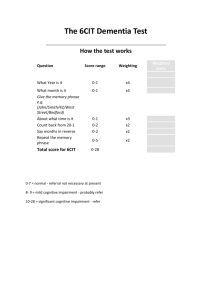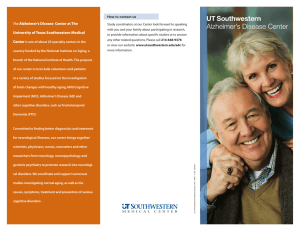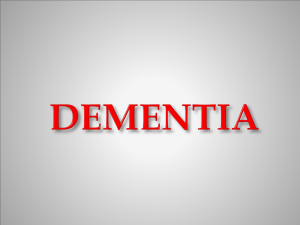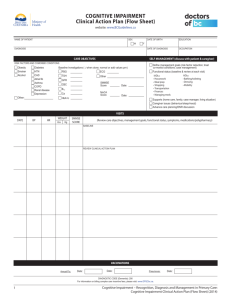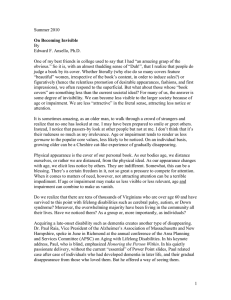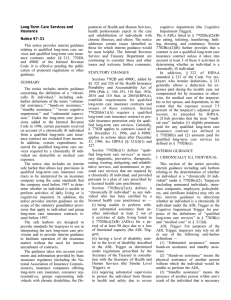Cognitive Impairment Physician’s Panel LTCIF May 2008
advertisement
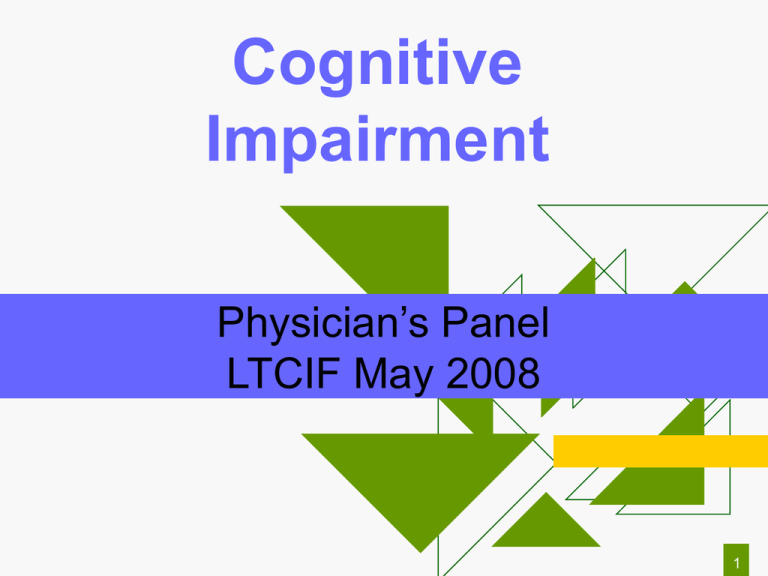
Cognitive Impairment Physician’s Panel LTCIF May 2008 1 Physician’s Panel 1. Dr. Engleking 2. Dr. Margolis 3. Claims Viewpoint Severe Cognitive Impairment Emphasis on Behaviors Underwriting Viewpoint Mild Cognitive Impairment Emphasis on Testing Case Study / Questions 2 LTCI Forum May 9, 2008 Phoenix, AZ SEVERE COGNITIVE IMPAIRMENT The Relationship to Behavior David W. Engleking, MD Consulting Medical Director Transamerica LTC 3 Objectives 1. 2. 3. 4. 5. Review claims-related triggers for TQ LTC policies Discuss in depth, the cognitive impairment trigger Explore the relationship of behavior to cognitive impairment Understand the spectrum & variability of behavior in dementia Consider a framework for assessing behavior 4 Health Insurance Portability & Accountability Act of 1996 (HIPAA) Establishes requirements for all TQ policies in the LTC universe Requires a Plan of Care (POC) from a licensed practitioner Requires claimant to be “chronically ill” 5 Defining Chronically ill ADL Trigger Similar Level Trigger Cognitive Impairment Trigger 6 The ADL Trigger Inability to perform at least two of six ADL’s, without substantial assistance for at least 90 days 7 The Cognitive Impairment Trigger (CI) Presence of severe cognitive impairment as defined by standardized neuropsychological tests & clinical evidence Need for substantial (continual) supervision to ensure safety Impairments may be in memory, orientation or judgment 8 Neuropsychological Testing – Advantages MMSE currently most commonly used claim assessment tool Quantifiable requiring minimal reviewer judgment Excellent for serial comparisons 9 Neuropsychological Testing - Disadvantages Lacks sensitivity/ specificity/ reproducibility Age, education & ethnicity are interpretative roadblocks Necessary, but insufficient to complete the full story 10 Clinical Evidence Clinical evidence includes behavioral assessment Aberrant behaviors result in poor judgment Behaviors span the entire psychiatric spectrum 11 The Behavioral Spectrum of CI 1. 2. 3. Depressive manifestations occur in 20 to 40% of CI Agitated manifestations occur in 50 to 80% of CI Psychotic manifestations occur in 30 to 40% of CI 12 The Depressive Manifestations of CI These include social withdrawal, apathy, depression & suicidal ideas These are early findings present in mild dementia even preceding diagnosis They are more likely in mixed or vascular forms of dementia 13 The Agitated Manifestations of CI These include anxiety, paranoia, irritability & wandering These are mid range findings present in mild to moderate dementia They frequently co-exist at the time of diagnosis 14 The Psychotic Manifestations of CI These include delusions, hallucinations, socially unacceptable, uninhibited, sexually aggressive behaviors They are very late findings well after diagnosis in people with severe CI They are more common in non Alzheimer's Dementias 15 Doctor – We’ve Got a Problem IT’S OVER! 16 Behavioral Assessment in Dementia Identify the problem behavior (what) Timing & frequency of the behavior (when) Surroundings / environment (where) Others involved (whom) Very troubling / dangerous Evaluation of whole patient Recommendations 17 Causes of Psychotic Behavior Schizophrenia Drug related side effects in Parkinsons Disease Therapy Delirium from medical illness Substance Abuse Dementia 18 Standardized Behavioral Assessment Tool Neuropsychiatric Inventory (NPI) 10 behavior questionnaire Caregiver is the informant Jeffrey Cummings, MD UCLA School of Medicine Neurology 1994; 44; 2308-2314 19 Medication Profiling Antidepressants: TCA’s, SSRI’s, Trazadone, Effexor, Cymbalta Older Antipsychotic Agents: Haldol, Thorazine & Mellaril Newer Atypical Antipsychotics: Respiradone, Seroqeul, Zyprexa, Geodon & Abilify 20 Behavior Logs Antipsychotic documentation required under OBRA Legislation in 1987 Includes symptom severity & frequency Planning / response for dosage reductions to prevent chemical restraint 21 Duke Clinical Research Institute Critical Challenges in Dementia Dallas, TX June 17, 2006 22 Mild Severity of Dementia: Correlating ADL’s, Behaviors & Cognition (MMSE) ADL’s – problem with routine tasks (IADL’s) Behaviors – personality changes, depressive manifestations Cognition – misplaces objects & mild confusion (MMSE > 21) NIH 2003 23 Moderate Severity of Dementia: Correlating ADL’s, Behaviors & Cognition (MMSE) ADL’s – needs help with basic tasks Behaviors – anxiety, paranoia, pacing & wandering Cognition – chronic recent memory loss, doesn’t always know family (MMSE range 12 – 20) NIH 2003 24 Severe Dementia: Correlating ADL’s, Behaviors & Cognition (MMSE) ADL’s – total dependency of caregiver Behaviors – yelling, sobbing, groping, fighting Cognition – loss of speech, misidentifies people (MMSE range <12) NIH 2003 25 Final Thoughts Severe cognitive impairment is not always an easy call Many gray zones. Frequent overlap in the ABC’s No single test or metric is sufficient Variability occurs more frequently with non Alzheimer’s Dementias Clinical experience / judgment is very helpful whether it is internal or from qualified outside consultants 26

